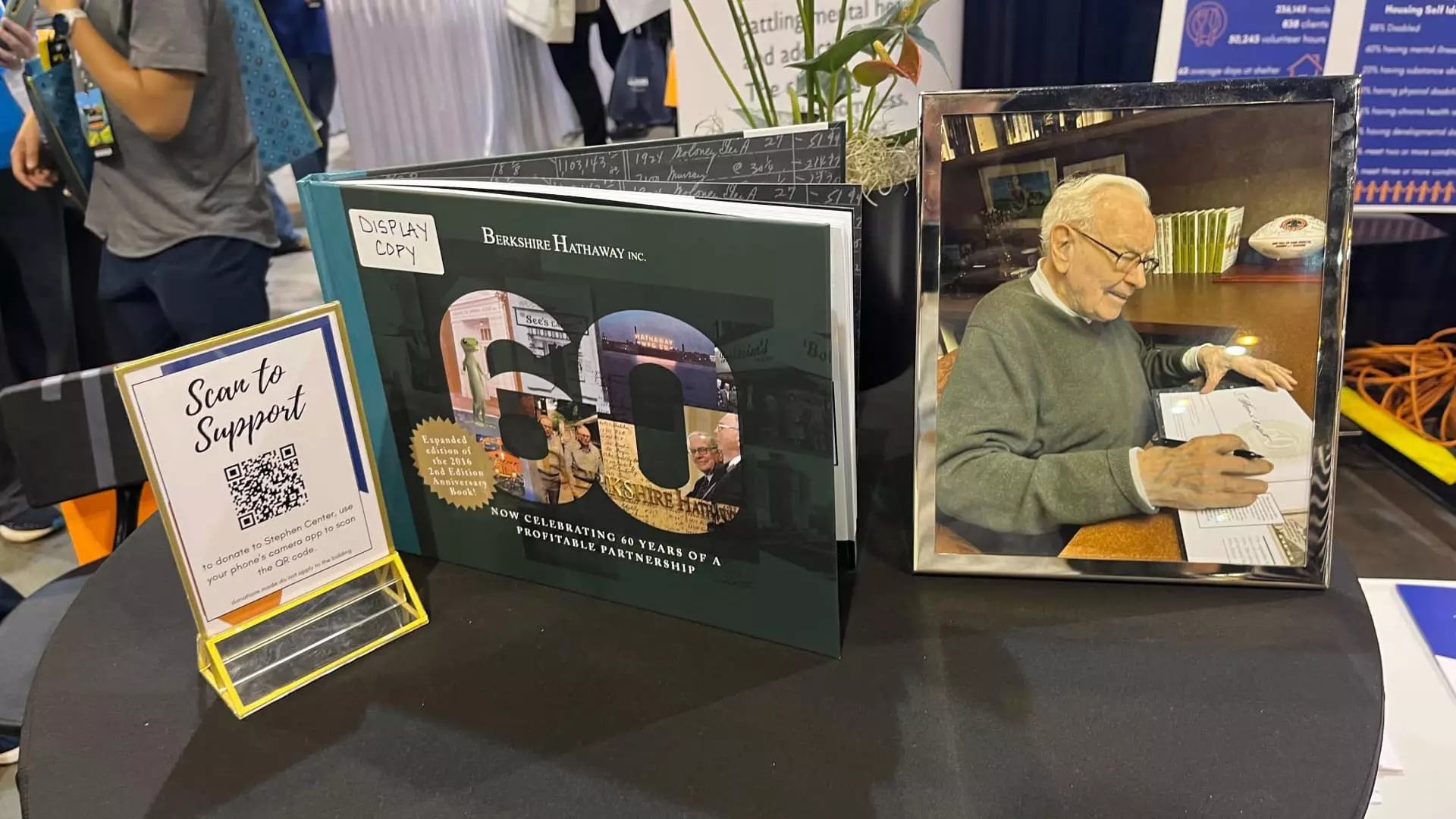Recently, Omaha buzzed with excitement as Berkshire Hathaway’s annual meeting unfolded, bringing together devoted shareholders and enthusiasts from all corners. This event was not just a showcase of Buffett’s enduring legacy, but a compelling charity initiative that raised over $1.3 million for the local Stephen Center. The nostalgia surrounding the legendary CEO, now 94 years old, was palpable as people eagerly awaited memorabilia, particularly a limited few signed editions of “60 Years of Berkshire Hathaway.” The fervor to own a piece of Buffett’s legacy led to frenzied bidding wars, illustrating the powerful connection people have with both the man and the ideals he represents.
Contributions to charity have always been part of Buffett’s ethos. This year, the spotlight was particularly bright, not just because of the impressive fundraising but also due to a surprise announcement about the CEO’s impending retirement. This moment further intensified the sentimental value of the memorabilia, prompting many to see their contributions as not merely an investment but a lasting narrative in corporate philanthropy.
Investing in Community: The Stephen Center’s Mission
The Stephen Center is not merely a shelter; it serves as a crucial resource in Omaha, focusing on providing housing and addiction recovery programs. Under the leadership of Chris Knauf, the organization mobilized to leverage Buffett’s celebrity status to amplify its local impact. This endeavor not only highlighted the importance of charity in a corporate environment but also raised awareness about homelessness and addiction recovery statistics, which continue to surge. Reports indicate nearly a 10% increase in the homeless population last year, particularly affecting families and vulnerable groups such as children and senior citizens.
Knauf articulates the gratitude felt by the organization, noting that many shareholders, inspired by Buffett’s words, took it upon themselves to donate even without participating in the auction. This communal effort subtly showcases how influential figures can ignite a greater societal commitment to addressing pressing issues like homelessness. It reveals a poignant truth: that solidarity can arise from history, nostalgia, and, yes, financial capital, creating a virtuous cycle of giving.
The Power of Celebrity and Philanthropy
Buffett’s approach to philanthropy offers a roadmap for corporate leaders: when you achieve success, it is not only your duty but your privilege to give back. The collective contribution from generous bid amounts—as high as $100,000—speaks volumes about how the right motivations can inspire individuals far beyond the traditional corporate framework. For instance, Matthew Rodriguez, a real estate professional and self-proclaimed “fan boy” of Buffett, recognized this and jumped into the bidding process with fervor. Rodriguez’s personal connection to Omaha and the local community’s struggles fueled his desire to act.
In this digital era, where money often switches hands globally in milliseconds, the notion of philanthropy is undergoing a transformation. With wire transfers originating from far-flung locations, we witness an unprecedented pooling of resources for local causes, all sparked by Buffett’s enduring legacy. The Stephen Center alone reported receiving checks from individuals who, instinctively feeling the urge to help, sent contributions directly before even hearing about the official auction.
A Paradigm Shift in Corporate Social Responsibility
The trend set forth by Buffett’s philanthropic endeavors hints at a potential paradigm shift in corporate social responsibility (CSR). Stakeholders today are increasingly discerning when it comes to investing in companies that exhibit social consciousness. Buffett’s legacy, combined with active shareholder participation in charity, teaches a fundamental lesson: when corporations align with meaningful causes, they foster a passionate community eager to support their mission.
Interestingly, Buffett himself has often rejected the notion of creating family wealth dynasties. By choosing to embed charity within his corporate philosophy, he challenges modern capitalism that often prioritizes profits over purpose. Corporate giants that ignore this shift may find themselves at risk of public backlash as consumers demand corporate accountability while supporting movements that emphasize relational values over materialism.
Buffett’s Lessons and the Road Ahead
Perhaps the most significant takeaway from this monumental event is the reminder that successful business leaders can—and indeed should—redefine their roles within the framework of society. By intentionally mapping their legacies onto community upliftment, CEOs create ripple effects that extend far beyond their boards. The numbers tell a tale of transformation; thousands of dollars raised, lives touched, and a community that now feels hopeful in the face of adversity.
Thus, as we look toward the future, the question becomes: will upcoming leaders step into the philanthropic space with the same vigor as Buffett? One can only hope that the narrative of wealth is increasingly interwoven with social purpose, ensuring all communities have the chance to thrive.

